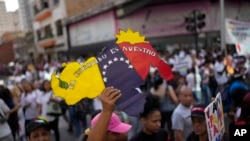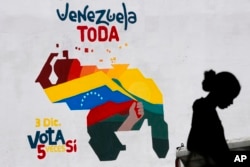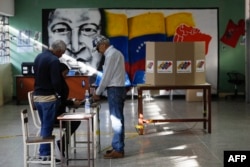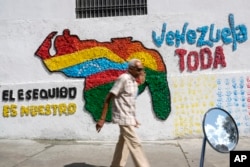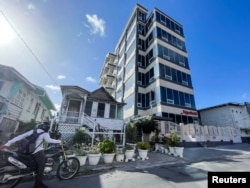Tensions continue to rise over Venezuela’s claim to the disputed Essequibo, a resource-rich strip of land that has been controlled and administered by Guyana for more than a century.
A contested number of Venezuelans voted to show their support for creating a Guayana Essequibo state to be incorporated into Venezuelan territory in the December 3 referendum.
The referendum’s legality is being disputed internationally, still, the Venezuelan leadership uses it to signal a potential use of force to annex the territory.
Analysts say Venezuela “intentionally timed” the referendum as Russia’s invasion and partial occupation of Ukraine, and Israel’s war with Hamas, hold the global spotlight.
Domestically, the broadly unpopular Venezuelan President Nicolas Maduro is facing an economic and political crisis that has seen millions leave the country. He could use the dispute over Essequibo to declare a state of emergency and halt next year’s presidential elections, the Spanish daily El Pais’ observer Florantonia Singer wrote on December 5.
To shift public opinion, the Venezuelan government weaponizes disinformation tactics claiming it is Guyana that is ratcheting up hostilities and flaunting global rules.
On December 6, as El Pais reported Venezuela dispatching “a military contingent” to Puerto Barima, near the border of Guyana in the state of Delta Amacuro, the Venezuelan Ministry of Foreign Affairs claimed:
“The Cooperative Republic of Guyana recklessly violates international law, taking actions that exacerbate the territorial dispute and add to its illegal conduct of granting oil exploitation rights to Exxon Mobil over a sea area pending delimitation with Venezuela.”
That is false.
It is Venezuela that has deployed military resources to its border with Guyana, pushed ahead with a referendum that neighboring states call illegal, rejected the top U.N. court’s jurisdiction over the case, and indicated its willingness to unilaterally assert its claims to territory that is internationally recognized as part of Guyana.
Earlier reports indicated that Venezuela had bulked up its troop presence on the border, and carried out exercises, under the pretext of halting illegal mining.
Venezuela has also publicized a plan to install an airstrip to provide logistical support to Venezuela’s development of the Essequibo.
Venezuela further announced the creation of “a new High Commission for the Defense of Guyana Esequiba,” and the creation of the “Guyana Integral Defense Zone,” to be headquartered in Tumeremo, a town in eastern Venezuela near the Essequibo.
This zone would be akin to special military commands that operate in certain regions of Venezuela, the Associated Press reported.
These moves by Venezuela come in violation of the United Nations directive.
In November, Guyana called upon the International Court of Justice, or ICJ — the top United Nations court that settles disputes between states in accordance with international law, to halt the December 3 referendum, arguing Venezuela’s actions were “a textbook case of annexation.”
The ICJ did not halt the referendum but warned Venezuela “it must refrain from taking any action which would modify that situation” regarding the status of Essequibo region as part of Guyana.
“Venezuela shall not take any actions that are intended to prepare or allow the exercise of sovereignty or de facto control over any territory that was awarded to British Guiana in the 1899 Arbitral Award,” the ICJ said.
“The Court emphasizes that the question of the validity of the 1899 Award and the related question of the definitive settlement of the land boundary dispute between Guyana and Venezuela are matters for the Court to decide at the merits stage.” Venezuela rejected the ICJ’s jurisdiction and went ahead with the referendum.
In September, the general secretariat of the Organization of American States (OAS), whose charter has been ratified by all 35 independent North and South American states, called Essequibo referendum “illegal according to the 1966 Geneva Agreement.”
The OAS warned that such moves have been used “to justify the worst actions between States, including the crime of aggression.”
The 1966 Geneva Agreement says that in case Venezuela and Guyana fail to resolve the border dispute peacefully, “they shall refer the decision as to the means of settlement to an appropriate international organ upon which they both agree or, failing agreement on this point, to the secretary-general of the United Nations.”
That is what Guyana did – it appealed to the United Nations. It was U.N. Secretary-General Antonio Guterres who chose the ICJ “as the means to be used for the solution of the controversy” in 2018 after Guyana and Venezuela failed to reach an agreement following decades of negations.
More historical context on the conflict from Polygraph.info is available here.
Also in September, CARICOM, a 15-nation Caribbean trade bloc that includes Guyana, called Venezuela’s “stated intention” of applying “all the necessary measures” to stop Guyana from developing Essequibo’s natural resources a threat to use force “contrary to international law.”
Still, Venezuela, whose military dwarfs that of Guyana, has signaled that force remains an option.
Venezuela would have to pass through neighboring Brazil to enter the 160,000-square-kilometer Essequibo, because of the difficult terrain elsewhere, pushing Brazil to reinforce its own border.
In 2018, the former President of Brazil Michel Temer vowed to defend Guyana following intelligence reports that Venezuela was mulling an invasion of Guyana.
Maduro also announced Venezuela would “immediately” begin exploring and exploiting Essequibo’s natural resources, including oil and gas, and he issued an order to create subsidiaries of state firms for that purpose.
International firms already working there, like ExxonMobil, have been given three months to leave.
Venezuela has moved against foreign ships in the region before, seizing a U.S.-operated oil ship sailing in the area 2013, and intercepting a vessel conducting a seismic survey for Exxon in 2018.
Additionally, Maduro has publicized a new map of Venezuela, which shows Essequibo as part of Venezuela.
In line with the December 3 referendum, Maduro also said Venezuelan citizenship would be granted to about 125,000 Guyanese residents of Essequibo.
Guyana says acting on these plans is illegal and has appealed to the U.N. Security Council and the United States for help.
On December 7, the U.S. Southern Command conducted joint flight operations within Guyana to enhance “security partnership” and “strengthen regional cooperation.”
Tensions heightened after ExxonMobil, which started oil and gas exploration activities in Guyana in 2008, made its “first significant oil find offshore Guyana” in 2015.
In claiming Essequibo, Venezuela says the natural resources fall within its 200-mile exclusive economic zone, not Guyana’s.
Venezuela is already one of the largest producers of oil worldwide. But despite its vast oil wealth, corruption and mismanagement have sparked a political, social and economic crisis that has left many Venezuelans impoverished.
